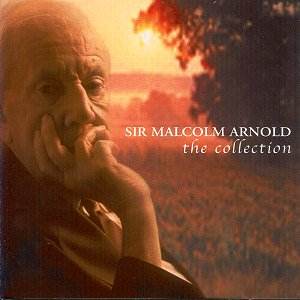 Composer: Sir Malcolm ARNOLD
Composer: Sir Malcolm ARNOLD
Works: Numerous, including A Grand, Grand Overture, Opus 57, Carnival of Animals, Opus 72, Concerto for 2 Pianos (3 Hands), Opus 104, and Guitar Concerto, Opus 67
Performers: Various, including the Royal Philharmonic Orchestra, Vernon Handley, and Julian Bream
Recording: Rec RCA 1959 (Guitar Concerto), RCA & Conifer 1992-97 (remainder)
Label: RCA-BMG
Sir Malcolm Arnold is an intriguing figure in British music, known for his harmonic inventiveness, rhythmic energy, and a keen sense of humor that pervades his compositions. This collection of his works, performed by a stellar roster of musicians, offers a comprehensive view of Arnold’s varied oeuvre and his remarkable contributions to 20th-century music.
The Royal Philharmonic Orchestra, under the baton of Vernon Handley, opens the program with a spirited rendition of A Grand, Grand Overture, Opus 57. The humor of Arnold’s score, complete with parts for vacuum cleaners and floor polishers, is not lost in the performance. Handley handles the balance between the orchestra and these unconventional instruments adeptly, ensuring that the novelty does not overshadow the underlying musicality.
In the Concerto for 2 Pianos (3 Hands), Opus 104, pianists David Nettle and Richard Markham demonstrate their virtuosity and interpretative understanding of Arnold’s idiosyncratic style. The challenge of playing a concert for three hands is met with finesse and a shared sense of rhythm, even during the most complex passages.
The Guitar Concerto, Opus 67, is a notable inclusion, recorded in 1959 with Julian Bream as the soloist and Arnold himself conducting. Bream’s interpretation is sensitive and introspective, especially in the slower second movement, where he brings out the Spanish undertones inherent in the guitar writing.
The various dances, from the English Dances, Opus 27 and 33, to the Scottish Dances, Opus 59 and Cornish Dances, Opus 91, are performed with buoyancy and a keen sense of rhythmic vitality by the respective ensembles. Particularly noteworthy is the BBC Concert Orchestra’s rendition of the Scottish Dances, which captures the folkloric elements of the music with a lively sense of rhythm and color.
The recording quality across the different sessions is generally high. The Guitar Concerto, despite being the earliest recording, has held up remarkably well, with Bream’s guitar clearly defined against the orchestral textures.
Historically, these works represent an important era in British music, where composers like Arnold sought to break new ground while also maintaining ties to their cultural roots. Arnold’s humor, blended with his technical prowess, creates a distinctive voice that is fully represented in this collection.
In comparison to other notable recordings, these performances stand their own ground, with a sense of commitment and understanding that brings out the best in Arnold’s music. The performers’ choices, whether in tempo, dynamics or phrasing, serve the music faithfully while also showcasing their interpretative insights.
In conclusion, this collection presents a comprehensive and satisfying survey of Sir Malcolm Arnold’s music, performed by musicians who understand and appreciate his unique voice. It serves as a testament to Arnold’s place in British music history, and a reminder of the joy, humor, and creativity that classical music can embody.